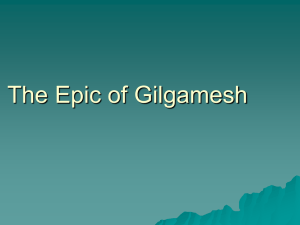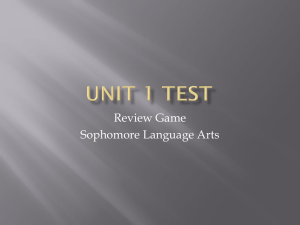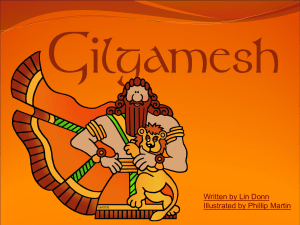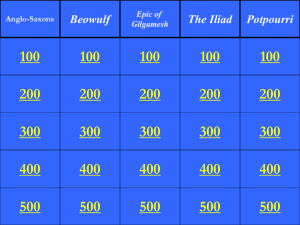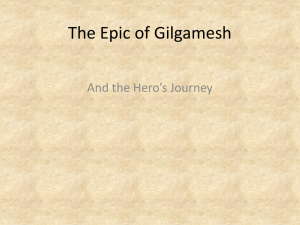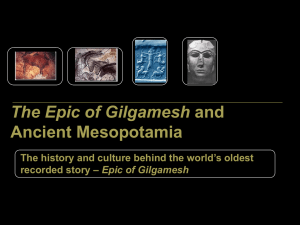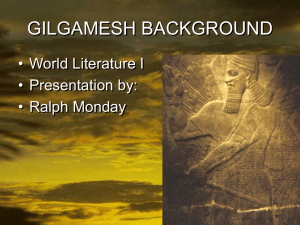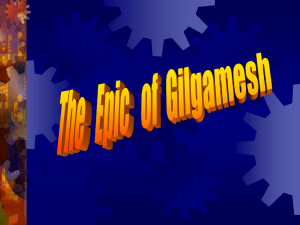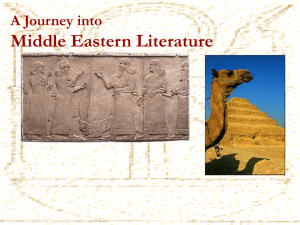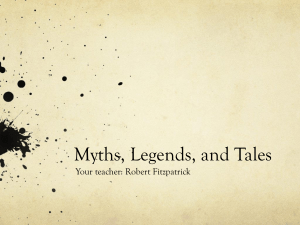Some Other End to Friendship
advertisement
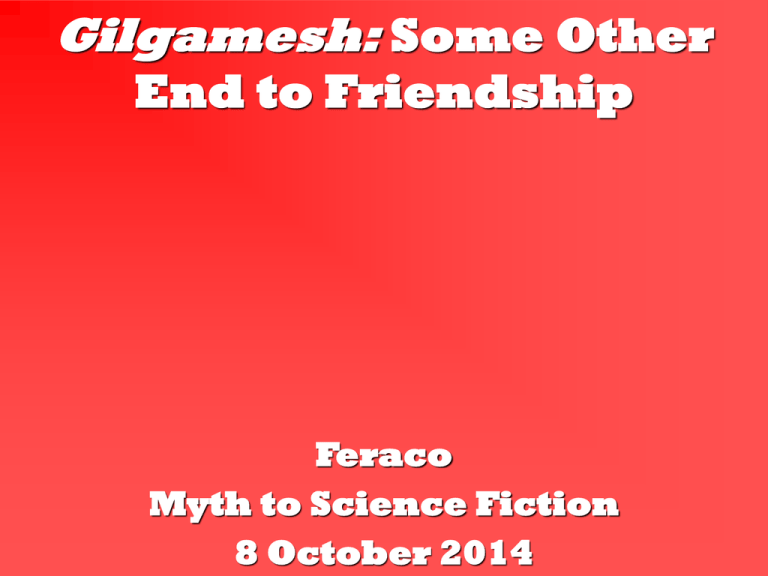
Gilgamesh: Some Other End to Friendship Feraco Myth to Science Fiction 8 October 2014 Gilgamesh makes his way towards the shore in order to meet Urshanabi, who serves as Utnapishtim’s boatman and can conceivably bring him to the latter man’s island when he returns. But Gilgamesh does not make his way calmly. True to form, he roars forward, axe in hand, shattering the stones that lie along the way. These stones take on various shapes in different translations. – In some, such as Mason’s, they’re simply stone charms. – In Mitchell’s, they’re stone men. – In others, they’re stone poles. Regardless of their forms, however, the stones serve a specific, critical purpose. They provide Urshanabi with a means of making his way across the Sea of Death safely, whether through magic (in the case of the charms) or power (the men power the ship, and the poles don’t shrivel when they touch the water). By shattering them, Gilgamesh has unintentionally obliterated the things he needed in order to get where he wants to go. There’s a certain cruel humor to the image of the savage king blundering his way forward, annihilating the very things that can help him. Mitchell’s translation goes so far as to show the stone men haplessly trying to flee, at which point Gilgamesh destroys them and, in a final insult, throws the shards into the Sea of Death. However, one must never lose awareness of the central grief metaphor that underlies the whole journey to the “underworld.” If Gilgamesh’s voyage through the desert represents one’s initial reaction to loss, and his passage through the Mashu tunnel represents the deepest part of one’s pain, his experiences with Siduri and the stones show a different phase of the grief cycle: lashing out, resisting help out of either fear, pain, or anger. In this phase, the victim (unintentionally) does harm to those trying to help him/her come to terms with his/her loss. Not only does Gilgamesh ignore Siduri’s considered words, but he hurts her, intentionally pushing himself away from her. Now fate has presented him with the ideal means to his end, but he’s so wrapped up in himself (as Siduri warned just prior to the incident) that he can’t help but undermine his own efforts. Unsurprisingly, Urshanabi is none too pleased to discover that Gilgamesh has shattered his stone whatevers; without them, he, too, now has no way back to Utnapishtim’s island. He will not help Gilgamesh… unless, in an interesting twist, Gilgamesh atones for the damage he’s caused by helping himself. This is another rehabilitative effort in disguise, but it’s different from what Siduri was trying to do. If the barmaid’s consolations, with an emphasis on comfort and on forgetting both pain and the source of one’s misery, represent “warm love,” Urshanabi’s represent “tough love.” By giving Gilgamesh a purpose – a specific directive (chop down three hundred trees, then drag them back to the coast where we’ll do something with them) – Urshanabi is forcing him to focus on something other than his own grief. This is, of course, exactly what Siduri was trying to do when she encouraged him to recognize life’s possibilities. But the specific task Urshanabi gives him – chop down trees – is eerily reminiscent, intentionally so, of the adventure that cost Gilgamesh his only friend. Moreover, in an echo of what Gilgamesh did upon emerging from the tunnel through Mashu, the boatman asks Gilgamesh to recount exactly what brought him to these strange shores, which brings everything that Siduri was telling him to forget back to the surface. One can wonder how this helps Gilgamesh, who has spent altogether too much time chewing his pain already, and lost much in the process. Simply put, Gilgamesh’s grief was beginning to resemble a feedback loop – the figurative scratched record we alluded to earlier – and was, in turn, beginning to feed on itself. By forcing Gilgamesh to consider the source of his grief, rather than focus on the grief itself, Urshanabi takes an approach familiar to any medical practitioner: address the underlying cause, not the symptoms (which is Siduri’s main mistake). Urshanabi’s directives make Gilgamesh’s pain both more real and more familiar – and it’s that familiarity that’s important, for we move past such losses through renewed purpose, the passage of time, and self-reflection and understanding. It’s fitting that, in some translations, Urshanabi goes so far as to accompany Gilgamesh on his return trip to Uruk; in many ways, he’s the one who gives Gilgamesh what he really needs. So Gilgamesh tells his tale of woe, follows Urshanabi’s directives, and builds his own poles for rowing. With his new companion – and it’s worth noticing that, at this stage, he’s no longer physically alone – Gilgamesh pushes off from the shore, taking control of his fate rather than rushing blindly forward (as he did in the “initial grief” passage in the Mashu tunnel, not to mention during the business with the stones). Each of his poles rots soon after touching the Waters of Death. The reason one would use stone poles over once-living wooden ones is that the Waters destroy that matter as swiftly as they ravage human bodies. You can touch the Waters, but prolonged contact is…not advised. When the last of the poles has fallen away, the grieving king uses his own clothes – the animal pelts that have served as his “shields” up to this point – as a sail, and the boat continues onward on the combined strength of his vulnerability and ingenuity. In the end, Gilgamesh does reach Utnapishtim. By this point, he’s said to “resemble loss itself,” whereas Utnapishtim’s eyes are full of hospitality – the same thing the harlot offered an abandoned Enkidu at the beginning of the epic. (In a poem full of parallel language, plot parallels are worth noting as well.) When he first realizes that Utnapishtim is not partly divine like himself – that he is, in fact, a frail old man with failing vision – Gilgamesh is disappointed. But when Utnapishtim asks him why he has come all this way, Gilgamesh speaks to him anyway. We’ll use Mitchell first, then Mason, for this next passage. I have wandered the world, climbed the most treacherous Mountains, crossed deserts, sailed the vast ocean, And sweet sleep has rarely softened my face. I have worn myself out through ceaseless striving, I have filled my muscles with pain and anguish. I have killed bear, lion, hyena, leopard, Tiger, deer, antelope, ibex, I have eaten Their meat and have wrapped their rough skins around me. And what in the end have I achieved? When I reached Siduri the tavern keeper I was filthy, exhausted, heartsick. Now let The gate of sorrow be closed behind me, And let it be sealed shut with tar and pitch. Gilgamesh was speaking but only to relieve His weight of grief, Not to demand an understanding: My friend has died so many times in me, And yet he still seems so alive, Like a younger brother, Then suddenly like soft tissue, A dried leaf… Is there something more than death? Some other end to friendship? Utnapishtim then speaks to his counterpart with a hand on the younger man’s shoulder, as one survivor to another. He talks about many things – everything from the wisdom of seeking guidance from “the blind” to the value of loyalty and human connection…and the true cost of obtaining the eternal life that Gilgamesh seeks.
